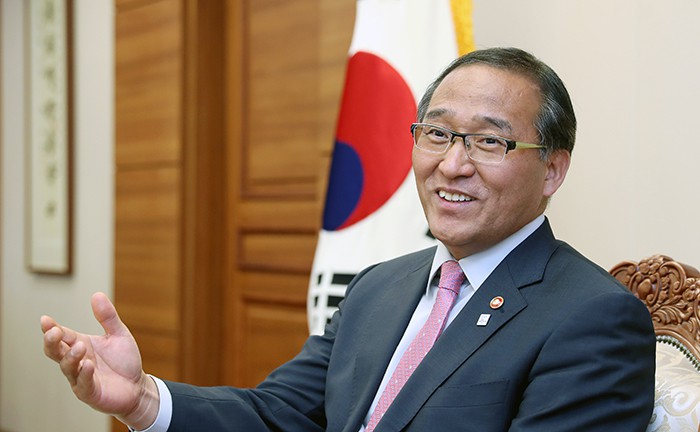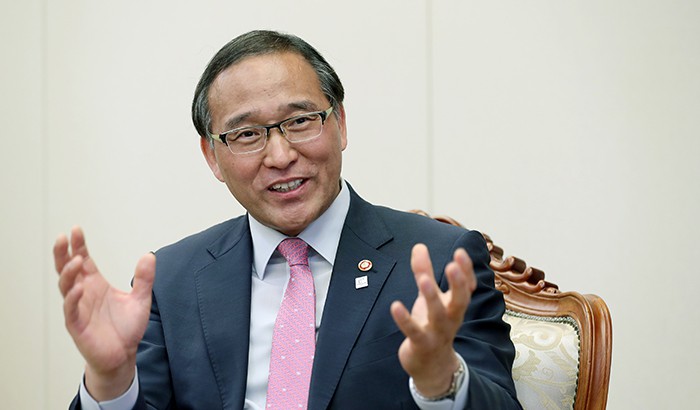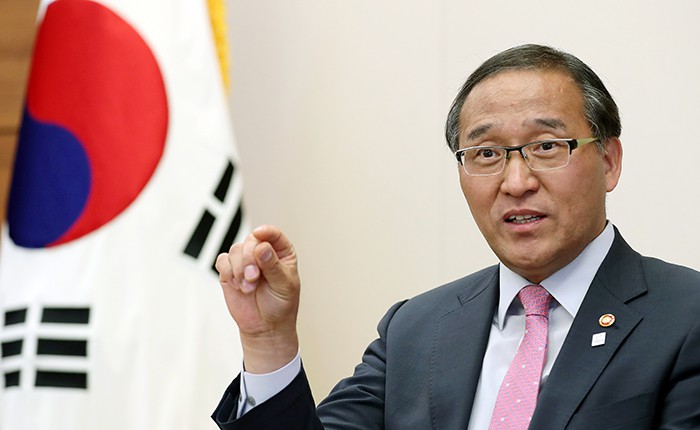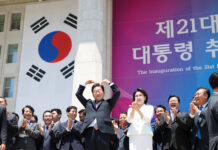
“Sharing both successes and failures is the basic direction of cooperation for both countries,” says Minister of the Interior Hong Yun-sik at the Government Complex-Seoul on April 10.
By Yoon Sojung
Photos = Jeon Han
April 10, 2017 | Seoul
“Sharing, not handing down.”
So said Minister of the Interior Hong Yun-sik on April 10.
He was talking about Korea’s overseas cooperation on public administrative services while sitting with Korea.net at the Government Complex-Seoul.
Minister Hong highlighted the fact that, “Cooperation is not meant to be one-way only. For this reason, it’s more appropriate to say ‘sharing’ instead of ‘initiating development cooperation.’ This is the basic direction of Korea’s overseas cooperation.”
This belief is wholly reflected in Korea’s many active overseas cooperation projects in the public administration sector.
For example, in March this year, Korea and Bahrain signed a contract to export Korea’s healthcare insurance system to the Middle Eastern country. Also, Korea and Ethiopia signed a customs clearance system agreement on the program known as UNI-Pass. In the same month, Korea also began to export its national ID card system, e-NID, to Kyrgyzstan.
Although these countries are in different regions of the world, in the Middle East, Central Asia or East Africa, and though they have different cultural backgrounds and experiences, Korea has extended to all of them cooperation on public administration.
“This is because these countries can share a set of experiences, lessons and reflections from the failures we had here in Korea, through cooperation,” said the minister, explaining the reason behind the government’s expanded cooperation projects.
“Even if we have an excellent system, it will still inevitably face failure if it’s implemented without reviewing the social development stages and circumstances of the partner country,” the minister said.
“All administrative systems should reflect the social development and conditions of the partner country in order to make proper, much-needed progress,” he said.
“Korea’s e-government system of online services was no exception,” he said.
“Although our system of e-government online services is Korea’s one of the most active sectors in terms of public administration cooperation overseas, we did experience many trials and errors. We reflected on our failures, learned our lessons and accumulated experience,” said the minister, mentioning some well-recognized e-government systems that have been exported, such as the customs clearance system Uni-Pass, and the immigration screening system, known as the Smart Entry Service (SES). Uni-Pass has been exported to more than 10 countries, and the SES can be seen in Mongolia, the U.S., Hong Kong and Macao.

“It’s impossible to cooperate without considering the social environment of the partner country,” says Minister of the Interior Hong Yun-sik. “Korea also failed many times in the past and we have been sharing both our lessons and our reflections from our failures with our partner countries through cooperation on public administration,” he says.
In fact, Korea has been concentrating on promoting innovation in its public administration for more than 20 years, he added. Other countries began to take an interest in public administration cooperation projects with Korea when it was ranked No. 1 in a U.N. E-Government Survey for three consecutive times after 2010, and when it topped the OECD’s Open Government Data list in 2015.
“Korea has been winning trust overseas as we can share both our failures and successes with our partners,” he explained further.
In the case of Kyrgyzstan, where Korea began exports of its e-NID cards this March, both countries built trust in 2015 when an automated electoral system was introduced in Kyrgyzstan. After Kyrgyzstan decided to adopt the automated electoral system by cooperating with Seoul, Korea carried out a thorough analysis and consultations about the country there. It supported and shared its know-how in establishing a data center, backed by Korea’s IT, and sent experts to Kyrgyzstan for some hands-on guidance.
When parliamentary elections were held in Kyrgyzstan in October 2015, the results were released within two hours after the start of counting thanks to the new system that enabled the counting of 95 percent of the ballots that quickly, earning faith and trust in its results. The U.K.-based Financial Times said in the article titled “Kyrgyz president halls ‘first free election'” on Oct. 10, 2015, that, “It will set a good example in Central Asia.”

“The government has been working hard on innovation in the public administrative service for more than 20 years. This makes many countries take an interest in cooperating with Korea in terms of administrative innovation,” Minister Hong says.
Uzbekistan is another model country in terms of public administration cooperation with Korea.
The country has been showing a strong interest in introducing IT-backed public administrative systems. It has been actively working with Korea, especially in establishing a government data center and an online criminal procedures system.
Minister Hong recalled a meeting with the late Uzbekistani President Islam Karimov in August last year.
During the meeting, President Karimov told him that, “Cooperation with Korea played a great role in helping Uzbekistan achieve social and economic development.”
The late president emphasized the significance of public administration cooperation with Korea by saying that, “It would have been impossible for Uzbekistan to upgrade its position by 20 places on the U.N.’s E-Government Development Index without cooperation with Korea.”
Despite successful cooperation projects with many countries, Minister Hong emphasized an “endless endeavor for self-innovation.”
“Korea will be willing to share its know-how with its overseas partners that need to share development cooperation experiences,” he said.
“We will also work with international organizations, such as the U.N. and the OECD, as well as regional organizations like the ASEAN, the Inter-American Development Bank and the Central American Integration System, in order to contribute to boosting happiness for all people on the globe,” he said with a smile.
arete@korea.kr























